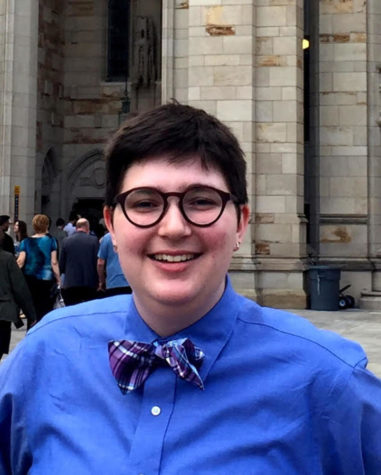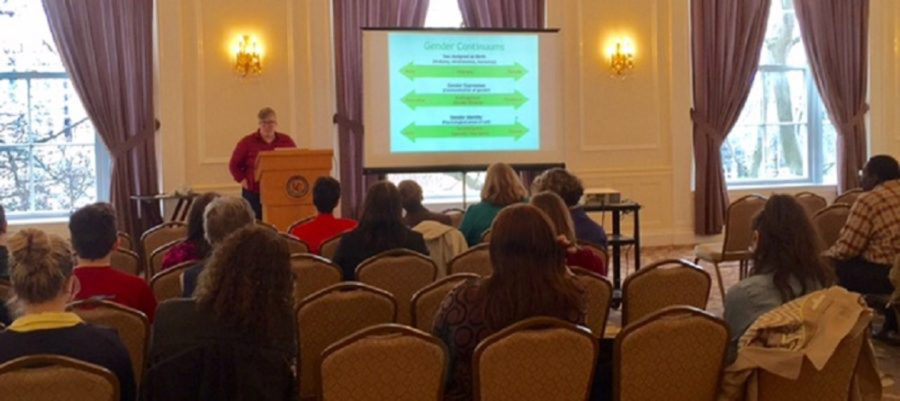Before joining Pitt’s transgender working group, Kate Shindle knew little about the obstacles to building gender-neutral restrooms.
“It’s not just as easy as saying that, ‘We need a gender-neutral restroom somewhere,’” Shindle, a senior biology major, said. “It’s also like, ‘Where’s plumbing in the area?’ ‘Does it match up to building codes?’”
The working group Shindle is a part of — which formed last summer — aims to study and evaluate University-wide transgender policies and make suggestions on how to best improve the experiences of transgender students.
Pitt started the group during the summer 2016 as a result of former Pitt Johnstown student Seamus Johnston’s 2013 lawsuit against the University.
Johnston — who was born female but identifies as male — was expelled in 2012 for using the school’s men’s locker room. He took up the issue in federal court on the grounds that the school was in violation of Title IX of the 1972 Education Act.
As part of the settlement he reached with the University out of court, Pitt formed the working group to address the needs of transgender students on campus.
The university chose Pam Connelly, Pitt’s first Vice Chancellor of Diversity and Inclusion, to organize this initiative last summer. The group is a mix of faculty, students and staff, including at least three transgender individuals. The group includes academics and diversity specialists along with facilities management professionals and database experts.
Connelly noted that the groups spent much of its first year identifying the existing University structures and practices in order to promote a more inclusive climate on campus.
“A good part of the first year was spent just figuring out what systems existed and what to do with them,” Connelly said.
The group first started with broad goals. These goals included expanding transgender individuals’ access to gender-specific spaces such as bathrooms and locker rooms and developing a plan for educating the Pitt community on transgender issues.
Pitt’s current bathroom policy states that faculty, staff and students are welcome to use restrooms corresponding to their gender identities. Student affairs also provides a map of single-occupancy and unisex facilities on campus.
According to Connelly, Pitt does not have a specific locker room policy. Transgender students are invited to use the University’s single-occupancy showers in each of the University’s recreation areas according to the Student Affairs website. It also says that any students with concerns about locker rooms may speak with a member of staff in the Baierl Recreation Center or contact the director of intramurals and recreation.
Members of the transgender working group eventually split into subcommittees to tackle additional, more specific issues. The committees convene each month to share their progress.
Shindle is part of the inside the classroom education subcommittee, which makes sure that professors are better educated on how to support their transgender students.
“It’s really important for us to have this committee so that we as students can communicate with the administration to try and make everything as inclusive as possible, so that transgender students can have the same opportunities and really reach their potential here at Pitt,” Shindle said.
Carrie Benson, a Title IX specialist and employee of the Office of Diversity and Inclusion, serves on the subcommittee that addresses issues in housing and student programming in residence halls. As part of its work last year, this subcommittee ensured the language on housing applications was appropriate in regards to gender.
“I have been impressed with what this group has accomplished in just one year,” Benson said. “Subcommittees were formed, two educational events were initiated and important conversations have taken place at every meeting.”
The transgender working group also focussed largely on awareness. Last year, it held panels and programs to bring attention to issues that affect the transgender community.
The group partnered with Persad, a counseling center specializing in transgender issues, to hold the Supporting Transgender Community Members event this past April. This program sought to provide the more than 65 staff and faculty in attendance with knowledge and guidance on how to provide respectful environments for transgender community members.
The group hosted a panel in June entitled “Education for Leadership and Citizenship on Trans Issues” as part of a new workshop series focused on transgender issues and curriculum reform, which brought together professionals, activists and educators from around Pittsburgh.

“I think that these things aren’t going to have an immediate effect on the climate at Pitt,” Shindle said. “But I do think that they’re starting the conversation and really encouraging people to think about these issues.”
Shindle has enjoyed seeing excitement and support from both students and Pitt’s administration for the working group’s efforts. The group has also given transgender people a forum to voice their concerns.
“We tell people at the Rainbow Alliance, ‘If you see something that’s not transgender inclusive let us know and we’ll pass it on, and we’ll try to make those changes,’” Shindle said. “It’s been really exciting because some people have brought up things like how the OCC, for example, collects information or how Peoplesoft collects information, and then we bring those concerns back and we’ve been able to change some of them.”
Connelly said that the working group’s committees will continue to focus on each of their specific goals in the coming year and work together to better identify areas for Pitt to improve in.
“We are a diverse group of people with different viewpoints and backgrounds, but we share a common goal — improving the lives of transgender individuals within the University community,” Connelly said. “That is enough to keep this group working, to keep that mindset that we can keep improving the world around us.”



